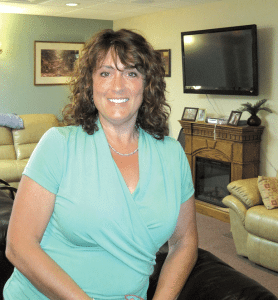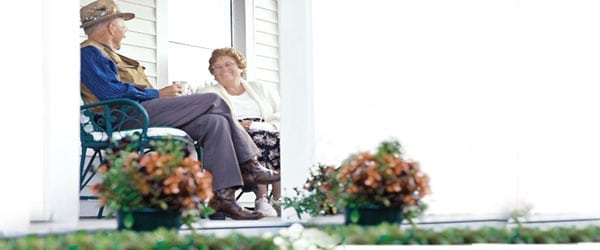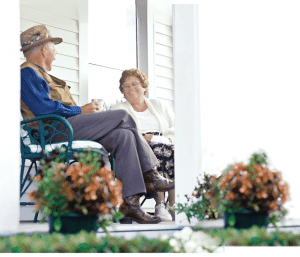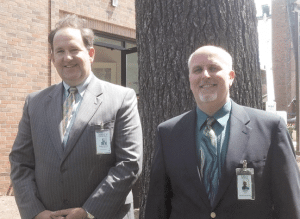Adult Day Health Spa Offers Elders, Caregivers a Healthy Option

Sheryl Fappiano says Golden Moments provides social and wellness services seniors need while giving their caregivers a measure of freedom.
When Shelley Parker and her husband, Jonathan Gottsche, took Parker’s elderly father into their home in Northampton last summer, it was a life-altering experience for all three.
A World War II Air Force veteran, the elder Parker had a two-year wait for placement in the Soldiers Home in Holyoke, a facility where all felt he would be comfortable for his remaining days, surrounded by other veterans. So the decision was made to make Parker’s and Gottsche’s home a bridge to that institution.
Richard Parker was 87 at the time and showing many symptoms of dementia, the same signs that other members of the family had shown in the past. Shelley already knew what to expect, which would be eventual 24/7 care for her father, and the loss of freedom for her and her retired husband.
“I’d always considered myself a planner, and I did plan; I prepared the healthcare proxy, the living will, the power of attorney,” said Parker. “But I didn’t plan for the time in which my father would be living.”
And that is the lesson that Parker and her husband learned in just a few short months by having her father with them.
“Planning ahead is really key,” Parker went on, “because we learned very quickly that there was only so much we could do to keep him busy every day that first four months.
“And with the winter coming, we said, ‘OK, this isn’t going to work for very long; ‘somebody’ isn’t going to make it for these two years,’” Parker continued with a laugh, referring to the buildup of stress and anger among husbands and wives that is common when taking on an elder parent full-time.
What changed the equation for the caregivers and the elder Parker is an option that is becoming increasingly popular due to the growing numbers of family members caring for elderly parents.
It’s called ‘adult day care,’ and BusinessWest spoke with one such company that is adding some new and effective wrinkles to that concept.
The venture is called Golden Moments Adult Day Health Spa, which offers structured programs featuring more attentive and customized services than the typical senior center for those who are frail or suffering from dementia, and some unique offerings as well, from massage to Reiki, that explain the word ‘spa’ in the company’s name.
In doing so, it has given new meaning to the elder Parker’s life, and new freedom to his his younger caregivers.
Golden Moments is the creation of Sheryl Fappiano, a licensed social worker and care-management-certified geriatric-care manager, whose mission is to see elders remain safe in their homes — or their adult children’s homes — for as long as possible. She puts her skills to work to fashion a unique environment where seniors can socialize and remain active, physically and mentally.
Her parent company, a geriatric-care management and consulting firm, Elder Care Access LLC, just celebrated 10 years in business, providing alternatives for working families with elders that need to be safe, and feel safe, wherever home may be.
Over the years, Fappiano saw a need to go a step further than consulting through Elder Care Access and provide a physical place that would allow elders with a range of physical, mental, and social needs to go to during the day, which would in turn give caregivers their own freedom. And she also knew that a social fix for an elder would also be more desirable than living alone or with family, which could become unsafe at any point, or incurring the exorbitant costs of home care or an elder facility.
For this issue and its focus on senior living, BusinessWest visited Golden Moments to learn more about this emerging concept in elder care, and how Fappiano and her staff are adding new dimensions in service to seniors.
Home Away From Home
During the time that Elder Care Access has grown and evolved, Fappiano, who has been in the geriatric-care industry for two decades, has witnessed a somewhat disturbing trend involving caregivers and the frustration and burnout experienced by that constituency.
“I started doing a lot of work with protective services with Highland Valley Elder Services [a Northampton-area agency on aging], and its department is just swamped with people [seniors] who are being abused, neglected, and sometimes financially exploited for one reason or another, and need oversight,” Fappiano told BusinessWest, adding that it was her job to go into such situations, provide support, offer solutions and resources for both the senior and the caregiver, and monitor the situation.
And it was while doing so that she determined that a cutting-edge form of adult day care could be an effective answer for those on both sides of this equation. So she went about making this latest entrepreneurial urge a reality.
Just over a year ago, she and her husband acquired space in the Florence Medical Center building and opened Golden Moments Adult Day Health Spa, a rather long name, chosen because it accurately conveys all that goes on there.
The facility now boasts more than 20 clients, who attend anywhere from three to nine hours, one to five days a week. The service, which ranges in cost from $45 to $85 per day, is paid for by the client or family, or may be covered by long-term-care insurance. In any case, the cost is significantly less than for other elder alternatives, such as assisted living or home care.
“Not only do both parties do better on every level, but the cost is less than half what it would be to live in an assisted-living or nursing home,” said Fappiano, noting that 24/7 care at home with an agency costs more than $500 dollars per day, even more than a nursing home, which runs about $300 a day, or $9,000 to $10,000 a month.
Parker began her research online for a solution to her father’s care needs, but found Golden Moments through word-of-mouth referrals first.
She and her husband visited several adult day-care facilities in the Pioneer Valley, but determined that Golden Moments offered the best overall fit for all those concerned, especially her father.
While the Florence Medical Center building itself is fairly sterile in appearance, with its concrete walls, Golden Moments projects a warm, inviting look and feel.
The main room, with its flickering fireplace, multiple plush couches, and numerous interactive games like bowling, beanbag toss, and board games, resembles a typical American living room. Meanwhile, the open back room has large sunny windows, and is a gathering place for lunches, card games, storytelling, and interactive word trivia that Fappiano and her six employees say helps clients with memory retention.
But aside from all the fun and games, there is the primary prescription for elder depression that is the key to the adult day-care concept.
“It’s totally the socialization — it helps with depression, anxiety … it’s huge,” said Fappiano, adding that this element to elder care is often missing in the traditional caregiver situation.
Elaborating, she said that when she consults in clients’ homes for her Elder Care Access company, she will often find caregivers leaving the elder client to eat alone in their dining room or kitchen, while the caregiver busies themselves with some other chore.
“I would tell them they have to sit, eat with them, talk with the elder client,” said Fappiano. “But it is hard being with the same person for hour after hour, and they do run out of things to say and do.”
This problem doesn’t generally exist at Golden Moments, she went on, because clients have many comtemporaries with whom to talk and interact, and there are different faces on most days.
As if on cue, another client arrived at Golden Moments, dropped off by an adult child who offered an obvious smile of relief.
“Top of the morning to you,” Fappiano cheerily said to her client, who genuinely broke out into a wide smile and returned the greeting in an Irish brogue. As the client, who is near 90, passed by slowly leaning on his cane, he joined his friends in the back room, much as a young boy would join his friends in school.
In fact, Fappiano said the first time a caregiver, which is usually the adult child, drops off an elder client, it’s like dropping off a child at their first day of kindergarten.
“We give everybody a free, three-hour trial, and in the beginning, when the caregiver drops them off, they have that look in their eye, and I tell them, ‘a quick exit is better; trust me when I say they’ll be OK. Give me your cell number, and I’ll call if I have to.’”
The feeling for the elder client can be similar to a small child in kindergarten as well, but they soon adjust to a new way of life. In fact, Fappiano has never had a potential client not return for weekly visits.
Vicky Applebee, office manager at Golden Moments, is not one of the direct-care staff members, but from her point of view, the atmosphere exudes family, for both clients and employees.
“Sometimes, when people first walk in the door, they are lost, unsure, even worried,” she said. “But after a few visits, I see this stress on their faces go away after getting into a new routine; that’s the biggest joy for me.”
Alternative Options
Fappiano said one of the keys to success at Golden Moments is knowing and fully understanding each client’s needs, capabilities, limits, and expectations, and then personalizing care to reflect all this data.
A comparatively low client-to-staff ratio (5 to 1 is generally the norm) enables the facility to tailor exercises and programs to suit each individual’s needs, rather than implement something approximating one size fits all. This is one operating philosophy that appealed to Parker as she sought a solution to her father’s needs, and one that differentiates the facility from others she visited.
“If they were taking a walk outside and one of the people could only walk a few feet, then that’s all everyone would walk that day,” she said, referring to one facility she toured. “I said, ‘no, that doesn’t work for me; if my father wants to walk a mile, he should be able to walk a mile.’”
Golden Moments has an LPN or RN on duty a few times a week to take vitals, work with stroke patients and other clients with specific needs, and administer medications, injections, and wound care as ordered by a primary-care physician.
In addition to regular activities involving socialization, such as memory word games, singing, special outings, and physical exercises, Fappiano is integrating more spiritual and “energy-related” alternative treatments that are more commonly found in the typical health spa.
Some alternative treatments and healing modalities include massage (also available for caregivers), Reiki, foot care by a holistic foot nurse, weekly pet therapy, sound and aromatherapy, and meditation.
But she’s finding some generational kickback.
“Those in their 90s, they don’t tolerate it so much; they just don’t understand the whole pampering thing,” Fappiano explained. “The younger ones … they get it, and we do meditation together.”
But Fappiano knows that a very open-minded group of aging Baby Boomers is headed her way, and Golden Moments is prepared to accept them when they’re ready.
The overall feeling in Golden Moments, she noted, is one of family from the minute a client or staff member walks into the room.
“Everyone is smiling around here … not sometimes, but every day,” said Applebee. “It’s a happy place, even with the struggles some might have at home, because caregivers get a much-needed break, and their loved ones are safe, staying active, and socializing.”
For Parker and her husband, the decision to bring her father into their home is, by all accounts, working, but basically because this unique adult day-care facility provides both client and caregiver what they need most — socialization and room to breathe, respectively.
“People [caregivers] say they have no time for themselves; they’re too busy,” she noted. “And I just see that, if they don’t figure out how to make things work, these situations could destroy relationships and families. My father is here, and this is allowing me to have my life, too.”
Elizabeth Taras can be reached at [email protected]









